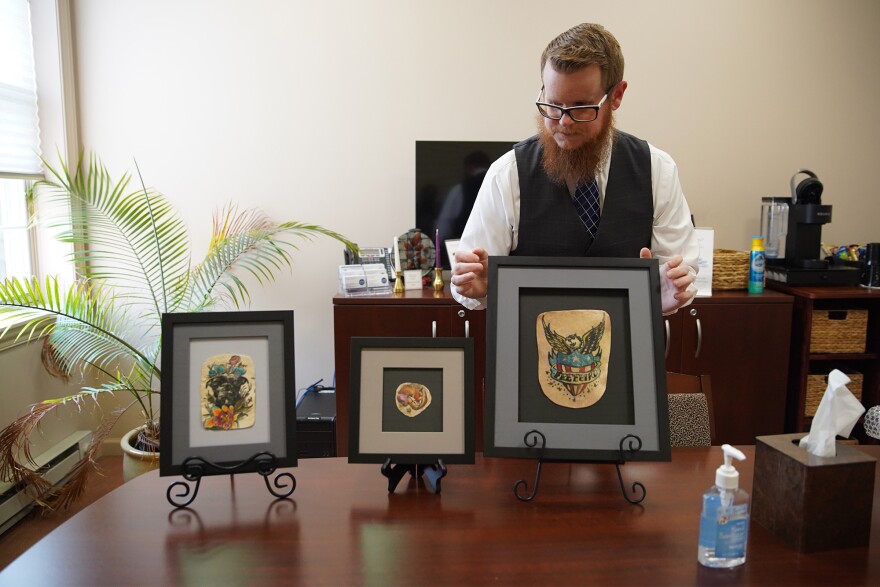“Save my tattoo when I die.”
That was Matthew Burleson’s final request to his sister, Cyndi, from his hospital bed in the Intensive Care Unit last April.
"One night he asked me, he said, I want one of my tattoos saved, and I was like, OK," Burleson said with a laugh.
She didn't know if it was possible until she found Save My Ink Forever, a Northeast Ohio-based company stationed out of a funeral home in Northfield. They say they’re the only company in the world offering post-mortem tattoo preservation: they remove the skin, they preserve it and they frame it for families.
Kyle Sherwood, the Chief Operating Officer, said it can be more personal than getting a loved one's ashes.
“People will say, ‘You know, I can't imagine the funeral home or funeral director giving me back an urn and saying this is my son whereas, with the tattoo, I have an actual piece of them and I saw that tattoo every day and I feel like they're home,'" Sherwood said.

He and his father, Michael Sherwood, had already offered creative memorial options like solidified cremains as decorative stones. But then a friend told them he wanted his tattoo preserved after he died, and they took up the challenge.
They needed practice. So they worked with tummy tuck patients to pay for tattoos on areas of skin that would be removed that they could then work to preserve.
They officially started offering the service in 2016. Business picked up quickly, and Kyle expects it to expand in the years to come.
"The younger generation will kind of more normalize what we are doing and that as time goes by, it will become more popular and more normalized," Sherwood said.
The funeral home's practice is part of a broader history of honoring dead body parts: some Southeast Mexican cultures' bone washing rituals date back to the time of the Mayans, Victorians created mementos from loved ones’ hair, and even post-mortem tattoo preservation is traced back to 19th century Japan.
Kyle said their business has grown beyond grieving families to people undergoing amputations or gender transitions.
"One person even said, hey, you know, I want to keep this tattoo as a reminder of who I was and the fresh start to my life," he said.
Some people may see it as macabre, but the Sherwoods see it as art preservation.

"We don't feel that the tattoo artists get the credit that they deserve because their choice of media is ink and skin, where some of these works were to be put, ink and canvas. You know, they would be recognized as Rembrandt and Michelangelo as modern day," Sherwood said.
The Sherwoods have gotten backlash: online commenters criticize their business as creepy or morbid, but that doesn’t deter them.
"Everyone has their own process when it comes to grief, and we can't tell you how to grieve and our thought process is that if this eases the burden even a little bit, what we're doing is, you know, completely worth it.”
Cyndi Burleson thinks so: she received her brother’s tattoo at her Wisconsin home just days before speaking to The Ohio Newsroom.
She and her siblings took a road trip to deliver the tattoo back to the artist who inked him years ago.
"When I handed it to her, just no words. Tears," Burleson said. "And I, I said to Jen, I think he meant for us to be together, to meet. He meant for us to meet."
It’s now hanging up at her tattoo station: the art returned to the artist.

